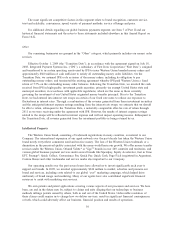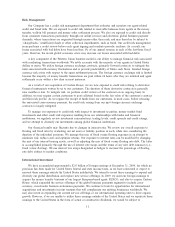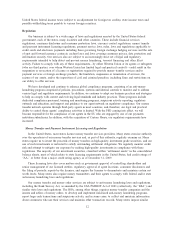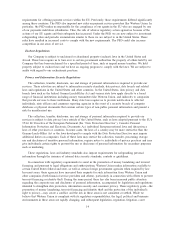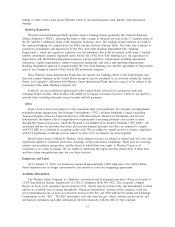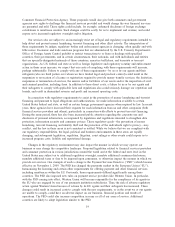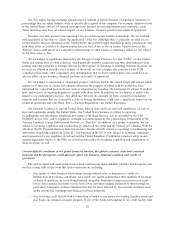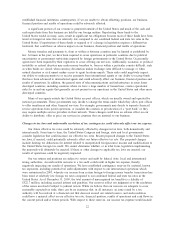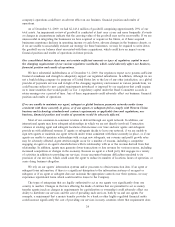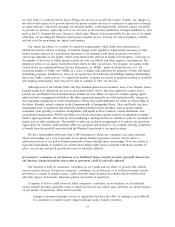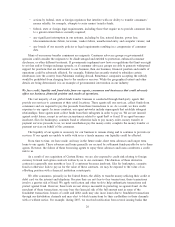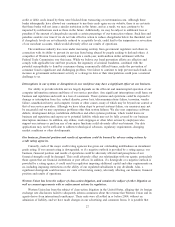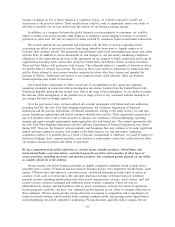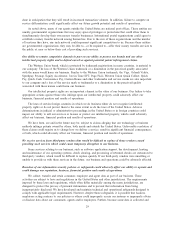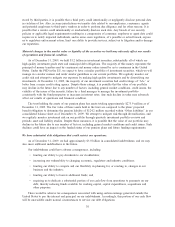Western Union 2009 Annual Report Download - page 34
Download and view the complete annual report
Please find page 34 of the 2009 Western Union annual report below. You can navigate through the pages in the report by either clicking on the pages listed below, or by using the keyword search tool below to find specific information within the annual report.Our fees and/or foreign exchange spreads may be reduced or limited because of regulatory initiatives or
proceedings that are either industry wide or specifically targeted at our company. For example, initiatives both
in the United States and at G-8 summit meetings have focused on lowering international remittance costs.
These initiatives may have an adverse impact on our business, financial position and results of operations.
Recently, one state passed a law imposing a fee on certain money transfer transactions. We are working
with legislators in that state to clarify the application of the fee. Although there is generally no sales tax on
money transfer services elsewhere in the United States, the current budget shortfalls in many jurisdictions may
lead other states or localities to impose similar taxes or fees. A tax or fee on money transfer services like
Western Union could put us at a competitive disadvantage to other means of remittance which are not subject
to the same taxes or fees.
We are subject to regulations imposed by the Foreign Corrupt Practices Act (the “FCPA”) in the United
States and similar laws in other countries, which generally prohibit companies and their intermediaries from
making improper payments to foreign officials for the purpose of obtaining or retaining business. Because our
services are offered in virtually every country of the world, we face a higher risk associated with FCPA
compliance than many other companies. Any determination that we have violated these laws could have an
adverse effect on our business, financial position and results of operations.
We are subject to unclaimed or abandoned property (escheat) laws in the United States and abroad which
require us to turn over to certain government authorities the property of others held by us that has been
unclaimed for a specified period of time, such as unpaid money transfers. We hold property subject to escheat
laws and we have an ongoing program to comply with those laws. In addition, we are subject to audits with
regard to our escheatment practices. Any difference between the amounts we have accrued for unclaimed
property and amounts that are claimed by a state or foreign jurisdiction could have a significant impact on our
results of operations and cash flows. See “—Escheat Regulations” for further discussion.
Our business is subject to various United States federal, state and local laws and regulations, as well as
laws and regulations outside the United States. Our United States business is subject to reporting,
recordkeeping and anti-money laundering provisions of the Bank Secrecy Act, as amended by the USA
PATRIOT Act of 2001, and to regulatory oversight and enforcement by the United States Department of the
Treasury Financial Crimes Enforcement Network, or “FinCEN.” In addition, as a money transmitter, we are
subject to licensing, regulation and examination by almost all the states and the District of Columbia. With the
advent of the EU Payment Services Directive we have become directly subject to reporting, recordkeeping and
anti-money laundering regulations in the EU. Our business in the EU is now subject to licensing, regulation
and examination by our regulators in Ireland and the United Kingdom. If additional countries adopt money
transfer legislation similar to the PSD, we could become subject to licensing, regulation and examination in
those locations, as well.
Current difficult conditions in the global financial markets, the global economic crisis and continued
financial market disruptions could adversely affect our business, financial condition and results of
operations.
The global capital and credit markets have been experiencing unprecedented volatility and disruption and
we face certain risks in the event that such events reoccur, including:
• Our agents or other business relationships having reduced sales or business as a result of a
deterioration in economic conditions. As a result, our agents could reduce their numbers of locations
or hours of operation, or cease doing business altogether. Businesses using our services may make
fewer cross-currency payments or may have fewer customers making payments to them through us,
particularly businesses in those industries that may be more affected by an economic downturn such
as the automobile, mortgage and financial services industries.
• Our revolving credit facility with a consortium of banks is one source for funding liquidity needs and
also backs our commercial paper program. If any of the banks participating in our credit facility fails
20


